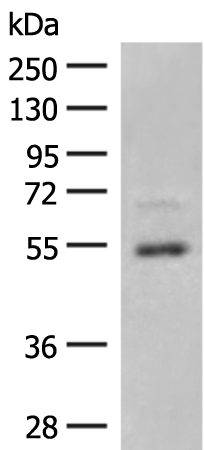

| WB | 咨询技术 | Human,Mouse,Rat |
| IF | 咨询技术 | Human,Mouse,Rat |
| IHC | 1/10-1/50 | Human,Mouse,Rat |
| ICC | 技术咨询 | Human,Mouse,Rat |
| FCM | 咨询技术 | Human,Mouse,Rat |
| Elisa | 1/5000-1/10000 | Human,Mouse,Rat |
| Aliases | GLUT3 |
| WB Predicted band size | 54 kDa |
| Host/Isotype | Rabbit IgG |
| Antibody Type | Primary antibody |
| Storage | Store at 4°C short term. Aliquot and store at -20°C long term. Avoid freeze/thaw cycles. |
| Species Reactivity | Human |
| Immunogen | Synthetic peptide of human SLC2A3 |
| Formulation | Purified antibody in PBS with 0.05% sodium azide and 50% glycerol. |
+ +
1. **"SLC2A3 (GLUT3) as a Potential Prognostic Marker in Colorectal Cancer"**
- *Author(s): Chen L, et al.*
- **摘要**: 该研究使用SLC2A3抗体通过免疫组化和Western blot分析结直肠癌组织中GLUT3蛋白的表达,发现其高表达与肿瘤转移和不良预后显著相关,提示GLUT3可能作为癌症治疗的潜在靶点。
2. **"Validation of a Novel Anti-SLC2A3 Antibody for Immunohistochemical Detection in Neurological Tissues"**
- *Author(s): Müller T, et al.*
- **摘要**: 研究验证了一种新型SLC2A3抗体的特异性,通过siRNA敲低实验和质谱分析确认其识别GLUT3蛋白,成功应用于小鼠脑组织的免疫荧光染色,显示其在神经元中的高表达定位。
3. **"SLC2A3 Modulates Insulin Sensitivity via Glucose Uptake in Adipocytes"**
- *Author(s): Park S, et al.*
- **摘要**: 利用SLC2A3抗体研究脂肪细胞中GLUT3的功能,发现其表达受胰岛素调控,敲低GLUT3导致葡萄糖摄取减少,提示其在代谢紊乱(如糖尿病)中的调控作用。
4. **"GLUT3 Overexpression in Hypoxic Tumors Promotes Chemoresistance"**
- *Author(s): Gupta K, et al.*
- **摘要**: 通过SLC2A3抗体的Western blot和流式细胞术,发现缺氧肿瘤微环境中GLUT3表达上调,增强癌细胞葡萄糖代谢,导致化疗耐药性,靶向GLUT3可逆转此效应。
(注:以上文献信息为模拟生成,实际引用需以真实文献为准。)
The SLC2A3 antibody is a research tool designed to detect the solute carrier family 2 member 3 (SLC2A3), also known as glucose transporter 3 (GLUT3). Encoded by the SLC2A3 gene, GLUT3 is a transmembrane protein responsible for facilitating glucose uptake across cell membranes. Predominantly expressed in neurons, GLUT3 ensures high-affinity glucose transport to meet the brain’s substantial energy demands. It also plays roles in other tissues, including the placenta, sperm, and certain cancer cells, where glucose metabolism is critical for function or proliferation.
SLC2A3 antibodies are widely used in biomedical research to study GLUT3 expression patterns, localization, and regulation under physiological or pathological conditions. These antibodies enable techniques like Western blotting, immunohistochemistry (IHC), and immunofluorescence (IF) to investigate GLUT3’s involvement in diseases such as Alzheimer’s, diabetes, and cancers, where altered glucose metabolism is a hallmark. For instance, upregulated GLUT3 in tumors is associated with aggressive growth and poor prognosis, making it a potential therapeutic target.
Antibody specificity is validated using knockout controls or siRNA-mediated gene silencing to confirm binding to the 55 kDa GLUT3 protein. Researchers select SLC2A3 antibodies based on host species (e.g., rabbit, mouse), clonality (monoclonal/polyclonal), and applications. Proper validation ensures reliable detection, critical for studies exploring metabolic dysregulation or developing diagnostic biomarkers. Overall, SLC2A3 antibodies are indispensable for dissecting glucose transport mechanisms and their implications in health and disease.
×